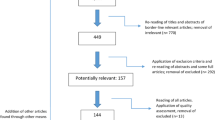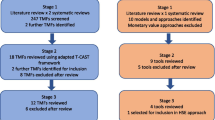Abstract
Aim
To describe the major knowledge translation processes, decisions, and organizations involved in the landmark decision to institute a national, federal program in one of the most populous countries of the world. The Maternal, Newborn and Child Health (MNCH) program was a vertical program that was established in 2006 in Pakistan.
Subject and method
Using the case study methodology, we conducted a peer and grey literature review, with key informant in-depth interviews for meeting the study objectives. We used Wilson et al’s Knowledge to Action (K2A) Framework to explore the knowledge translation processes, the major decisions, and the national and international organizations involved during the 7-year period preceding the decision. The time period was selected based on the change in government in late 1998, which continued till the establishment of the national program.
Results
Using the framework, we categorized knowledge translation practices and major decisions into phases of research, translation, and institutionalization. We were able to identify 20 organizations that had played a part in the institution of the program, of which six national and international were considered significant towards effecting decisions. While organizations such as the World Bank and Pakistan Ministry of Health played important roles, we highlight the pivotal role of the Health Secretary’s office, as an unusual ‘knowledge broker’ situated within the Government.
Conclusion
While effective program planning in low middle-income countries can greatly benefit from knowledge translation practices, explaining processes from evidence generation to the final step of key decisions is valuable in understanding the complexities involved in such settings. The study begins to fill a critical gap in literature in illustrating real-world program planning in resource-constrained countries, lagging in maternal and child health indicators.
Similar content being viewed by others
Abbreviations
- ADB:
-
Asian Development Bank
- AusAid:
-
Australian Department for International Aid
- CMW:
-
Community Midwife
- DFID:
-
Department for International Development, UK
- ESP:
-
Economic Survey of Pakistan
- JICA:
-
Japanese International Cooperation Agency
- K2A:
-
Knowledge to Action
- KT:
-
knowledge translation
- MCH:
-
Maternal and Child Health
- MICS:
-
Multiple Indicator Cluster Survey
- MMR:
-
Maternal Mortality Ratio
- MNCH:
-
Maternal, Neonatal and Child Health
- MOH:
-
Ministry of Health
- NCMNH:
-
National Commission for Maternal, Neonatal and Child Health NGO
- NGO:
-
Non-government organization
- NNS:
-
National Nutrition Survey
- NSF:
-
National MNCH Strategic Framework
- P&D:
-
Ministry of Planning and Development
- PC-1:
-
Planning Commission Document/Proforma-One
- PDHS:
-
Pakistan Demographic Health Survey
- PIHS:
-
Pakistan Integrated Household Survey
- PLSMS:
-
Pakistan Living Standard Measurement Survey
- SBA:
-
Skilled Birth Attendant/Attendance
- TAMA:
-
Technical Agency for Management Assistance
- UNFPA:
-
United Nations Population Fund
- USAID:
-
United States Aid for International Development
- WB:
-
The World Bank
- WHO:
-
World Health Organization
References
Adam T et al (2005) Cost effectiveness analysis of strategies for maternal and neonatal health in developing countries. BMJ 331:1107
Ahmed SM et al (2016) Cross-country analysis of strategies for achieving progress towards global goals for women’s and children’s health. Bull World Health Organ 94:351
Anderson LM, Brownson RC, Fullilove MT, Teutsch SM, Novick LF, Fielding J, Land GH (2005) Evidence-based public health policy and practice: promises and limits. Am J Prev Med 28:226–230
ADB (2008) Validation report, Pakistan: women’s health project. Asian Development Bank, Manila, Philippines
ADB (2010) Validation report, Pakistan: reproductive health project. Asian Development Bank, Manila, Philipplines
Bhutta ZA (2000) Why has so little changed in maternal and child health in South Asia? Br Med J 321:809
Bhutta ZA (2004) Maternal and child health in Pakistan: challenges and opportunities. Oxford University Press, Oxford
Buse K, Mays N, Walt G (2012) Making health policy. McGraw-Hill Education (UK), London
Creswell JW (2013) Research design: qualitative, quantitative, and mixed methods approaches. Sage Publications, Thousand Oaks
Dobbins M et al (2009) A description of a knowledge broker role implemented as part of a randomized controlled trial evaluating three knowledge translation strategies. Implement Sci 4:23
Estabrooks CA, Thompson DS, Lovely JJ, Hofmeyer A (2006) A guide to knowledge translation theory. J Contin Educ Heal Prof 26:25–36. https://doi.org/10.1002/chp.48
Federal Bureau of Statistics GoP (2002) Pakistan integrated household survey round 4: 2001–02. Federal Bureau of Statistics, Government of Pakistan, Islamabad
Fikree F (2002) Safe motherhood in Pakistan: past failures, future challenges. JPMA J Pak Med Assoc 52:538
Finance PMo (2003) Economic survey of Pakistan 2002–03. Ministry of Finance, Islamabad
Government of the Punjab PDD, Bureau of Statistics (2009) Multiple Indicator cluster survey Punjab 2007–08 volume 1 provincial report. Federal Bureau of Statistics, Government of Pakistan, Islamabad
Green J, Browne J (2005) Principles of social research. McGraw-Hill International, New York
Hsieh H-F, Shannon SE (2005) Three approaches to qualitative content analysis. Qual Health Res 15:1277–1288
Ian D, Graham JMT (2009) Getting evidence into policy and practice: perspective of a health research funder. J Can Acad Child Adolesc Psychiatry 18:47
International NIoPSaM (2008) Pakistan demographic and health survey 2006–07. National Institute of Population Studies, Islamabad
Iram Yasir BTS (2011) Use of evidence for decision making: a qualitative exploratory study on MNCH program, Pakistan. Pak J Public Health 1:5
Islam A, Malik F (2001) Role of traditional birth attendants in improving reproductive health: lessons from the family health project, Sindh. JPMA J Pak Med Assoc 51:218–221
Jafarey S (2002) Maternal mortality in Pakistan—compilation of available data. JPMA J Pak Med Assoc 52:539–544
Kelly MP, Speller V, Meyrick J (2004) Getting evidence into practice in public health. NHS Health Development Agency, London
Khan A et al (2012) Newborn survival in Pakistan: a decade of change and future implications. Health Policy Plan 27:iii72–iii87
Lavis JN, Lomas J, Hamid M, Sewankambo NK (2006) Assessing country-level efforts to link research to action. Bull World Health Organ 84:620–628
Lawn JE, Cousens S, Zupan J, Team LNSS (2005) 4 million neonatal deaths: when? Where? Why? Lancet 365:891–900
Lawn JE et al (2006) 1 year after the Lancet Neonatal Survival Series—was the call for action heard? Lancet 367:1541–1547
Marsh DR, Fikree FF (1994) Verbal autopsy: an alternate technique for assigning cause of death. J Pak Med Assoc 44:178–179
Martines J et al (2005) Neonatal survival: a call for action. Lancet 365:1189–1197
Mays N, Pope C (2000) Assessing quality in qualitative research. BMJ 320:50–52
Merriam SB (2009) Qualitative case study research. In: Qualitative research: a guide to design and implementation. Jossey-Bass, San Francisco CA, pp 39–54
Ministry of Health GoP (2001) National Health Policy 2001: the way forward, agenda for health sector reform. Ministry of Health Pakistan, Islamabad
Ministry of Health GoP (2005) Pakistan: maternal and child health policy and strategic framework (2005–2015). Ministry of Health Pakistan, Islamabad
Ministry of Health GoP (2006) National Maternal Newborn and Child Health (MNCH) Program. Ministry of Health Pakistan, Islamabad
Natow RS (2019) The use of triangulation in qualitative studies employing elite interviews. Qualitative Research 2019:1468794119830077
Nishtar S, Mehboob AB (2011) Pakistan prepares to abolish ministry of health. Lancet 378:648–649. https://doi.org/10.1016/s0140-6736(11)60606-5
Norton TC, Howell C, Reynolds C (2016) Exploratory study of the role of knowledge brokers in translating knowledge to action following global maternal and newborn health technical meetings. Public Health 140:235–243
WHO (2000) Maternal mortality in 2000: estimates developed by WHO, UNICEF and UNFPA. World Health Organization, Geneva
WHO (2019) Maternal mortality ratio (per 100 000 live births). World Health Organisation, Geneva. https://www.who.int/healthinfo/statistics/indmaternalmortality/en/. Accessed: 2019-03-20. (Archived by WebCite® at http://www.webcitation.org/771HxAsxD)
Orton L, Lloyd-Williams F, Taylor-Robinson D, O'Flaherty M, Capewell S (2011) The use of research evidence in public health decision making processes: systematic review. PLoS One 6:e21704. https://doi.org/10.1371/journal.pone.0021704
Pakistan PCo (1955) First Five-Year Plan 1955–60. Planning Commission of Pakistan, Karachi
Pakistan PCo (1960) Second Five-Year Plan 1960–65. Planning Commission of Pakistan, Karach
Pakistan PCo (1965) Third Five-Year Plan 1965–70. Planning Commission of Pakistan, Karachi
Pakistan PCo (1970) Fourth Five-Year Plan 1970–75. Planning Commission of Pakistan, Islamabad
Pakistan PCo (1978) Fifth Five-Year Plan 1978–83. Planning Commission of Pakistan, Islamabad
Pakistan PCo (1983) Sixth Five-Year Plan 1983–88. Planning Commission of Pakistan, Islamabad
Pakistan PCo (1988) Seventh Five-Year Plan 1988–93. Planning Commission of Pakistan, Islamabad
Pakistan PCo (1993) Eighth Five-Year Plan 1993–98. Planning Commission of Pakistan, Islamabad
Srivastava P, Hopwood N (2009) A practical iterative framework for qualitative data analysis. Int J Qual Methods 8:76–84
Straus S, Tetroe J, Graham I (2009a) Science and practice of knowledge translation: moving from evidence to practice. Wiley–Blackwell BMJ Books, West Sussex
Straus SE, Tetroe J, Graham I (2009b) Defining knowledge translation. CMAJ 181:165–168. https://doi.org/10.1503/cmaj.081229
Studies NIoP (2007) Status of women, reporoductive health and family planning survey: main report. National Institute of Population Studies, Islamabad
Thompson GN, Estabrooks CA, Degner LF (2006) Clarifying the concepts in knowledge transfer: a literature review. J Adv Nurs 53(6):691–701
Tinker A, Parker R, Lord D, Grear K (2010) Advancing newborn health: the saving newborn lives initiative. Glob Public Health 5:28–47
Tong A, Sainsbury P, Craig J (2007) Consolidated criteria for reporting qualitative research (COREQ): a 32-item checklist for interviews and focus groups. Int J Qual Health Care 19:349–357
Ward V, House A, Hamer S (2009) Knowledge brokering: the missing link in the evidence to action chain? Evid Policy 5:267–279
Wilson KM, Brady TJ, Lesesne C, Translation NWGo (2011) An organizing framework for translation in public health: the knowledge to. Action Framework Prev Chronic Dis 8:A46
Yin RK (2011) Qualitative research from start to finish, 1st edn. The Guilford Press, New York
Acknowledgements
We wish to acknowledge support and assistance of Mr. Arsalan Bashir and Mr. Muhammad Imran, both Research Associates at the Subh-e-Nau: and Environment and Public Health Concern Pakistan, in the literature review, ethical review, setting up the interviews and their transcription. We also thank Janna MacLachlan, MSc OT, Dalla Lana School of Public Health, University of Toronto, for reviewing the transcript and providing critical feedback. Finally, we especially thank the study participants for their valuable time, input and cooperation throughout the course of the study. This study would not have been possible without the support and able guidance of Dr Boika Rechel and Dr Sue Lawrence, both research supervisors at the London School of Hygiene and Tropical Medicine, University of London UK.
Author information
Authors and Affiliations
Corresponding author
Ethics declarations
Ethical statement
The study was not funded, and the authors received no compensation for any related activity. The study was undertaken as part of the requirement of the first author’s MSc Public Health degree at the London School of Hygiene and Tropical Medicine. Informed consent was obtained from all individual participants included in the study. All procedures performed in studies involving human participants were in accordance with the ethical standards of the institutional and/or national research committee and with the 1964 Helsinki Declaration and its later amendments or comparable ethical standards.
The study protocol was approved by both international and national ethical review boards that included the London School of Hygiene and Tropical Medicine’s Ethical Review Board (LSHTM MSc Ethics Ref: 7462) and the National Bioethics Committee, Pakistan Medical Research Council. There were no risks or benefits to the participants. We took special care to maintain anonymity and confidentiality. Transcripts were anonymized by assigning an alias, while we do not refer to individual respondents or their organizations in presenting our findings.
Conflict of interest
The authors have no conflicts of interest to declare.
Additional information
Publisher’s note
Springer Nature remains neutral with regard to jurisdictional claims in published maps and institutional affiliations.
Rights and permissions
About this article
Cite this article
Chishtie, J., Chishtie, F. & Jaglal, S. Exploring knowledge translation practices in a global health program: case study on the establishment of the Pakistan National Maternal, Neonatal, and Child Health Program. J Public Health (Berl.) 29, 215–228 (2021). https://doi.org/10.1007/s10389-019-01115-y
Received:
Accepted:
Published:
Issue Date:
DOI: https://doi.org/10.1007/s10389-019-01115-y




